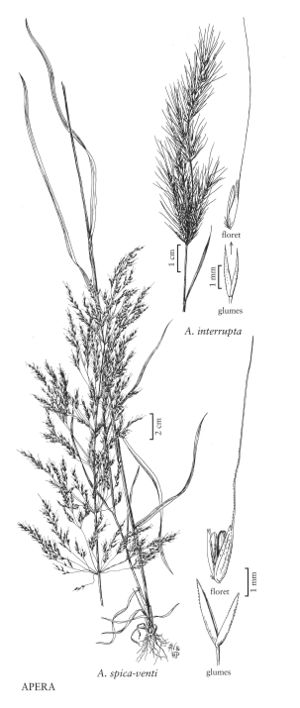Difference between revisions of "Apera spica-venti"
FNA>Volume Importer |
FNA>Volume Importer |
||
| Line 1: | Line 1: | ||
{{Treatment/ID | {{Treatment/ID | ||
|accepted_name=Apera spica-venti | |accepted_name=Apera spica-venti | ||
| − | |accepted_authority= | + | |accepted_authority= |
|publications= | |publications= | ||
|common_names=Common windgrass;Loose silkybent | |common_names=Common windgrass;Loose silkybent | ||
| Line 16: | Line 16: | ||
-->{{Treatment/Body | -->{{Treatment/Body | ||
| − | |discussion=<p>Apera spica-venti grows as a weed in lawns, waste places, grain fields, sandy ground, and roadsides. Introduced from Europe, it is found in scattered locations in the Flora region.</p> | + | |discussion=<p><i>Apera spica-venti</i> grows as a weed in lawns, waste places, grain fields, sandy ground, and roadsides. Introduced from Europe, it is found in scattered locations in the Flora region.</p> |
|tables= | |tables= | ||
|references= | |references= | ||
| Line 25: | Line 25: | ||
-->{{#Taxon: | -->{{#Taxon: | ||
name=Apera spica-venti | name=Apera spica-venti | ||
| − | + | |authority= | |
| − | |authority= | ||
|rank=species | |rank=species | ||
|parent rank=genus | |parent rank=genus | ||
| Line 32: | Line 31: | ||
|basionyms= | |basionyms= | ||
|family=Poaceae | |family=Poaceae | ||
| − | |illustrator=Linda | + | |illustrator=Linda Ann Vorobik;Hana Pazdírková |
| + | |illustration copyright=Utah State University | ||
|reference=None | |reference=None | ||
|publication title= | |publication title= | ||
|publication year= | |publication year= | ||
|special status= | |special status= | ||
| − | |source xml=https:// | + | |source xml=https://jpend@bitbucket.org/aafc-mbb/fna-data-curation.git/src/f50eec43f223ca0e34566be0b046453a0960e173/coarse_grained_fna_xml/V24/V24_1125.xml |
|subfamily=Poaceae subfam. Pooideae | |subfamily=Poaceae subfam. Pooideae | ||
|tribe=Poaceae tribe Poeae | |tribe=Poaceae tribe Poeae | ||
Revision as of 21:18, 16 December 2019
Culms 20-80(120) cm, stout, usually with several shoots, sparingly branched; internodes shorter or longer than the sheaths. Sheaths often purplish; ligules 3-6(12) mm; blades usually 6-16(25) cm long, 2-5(10) mm wide, flat. Panicles (5)10-35 cm long, (2)3-15 cm wide, usually open, pyramidal; branches spreading, naked at the base for 5+ mm, with spikelets usually borne towards the distal ends; pedicels 1-3 mm. Spikelets 2.4-3.2 mm, often purplish; rachillas prolonged for about 0.5 mm. Lower glumes 1.5-2.5 mm; upper glumes 2.4-3.2 mm; lemmas 1.6-3 mm, folded, scabridulous above midlength, awned, awns 5-12 mm; anthers 1-2 mm, greenish to yellowish, often purple-tinged. Caryopses 1-1.5 mm. 2n = 14.
Discussion
Apera spica-venti grows as a weed in lawns, waste places, grain fields, sandy ground, and roadsides. Introduced from Europe, it is found in scattered locations in the Flora region.
Selected References
None.
